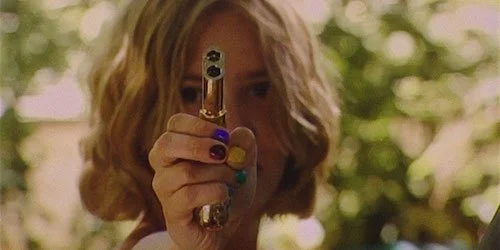Arthur & Diana
Written by Andreas Babiolakis
Warning: The following review is of a film that is part of TIFF 2023 and may contain spoilers for Arthur & Diana. Reader discretion is advised.
Image courtesy of TIFF.
The latest film from rising filmmaker Sara Summa is Arthur & Diana: a road trip detour which feels heavily driven by nostalgia. These organic feelings of memories past may be due to the clever casting choice of Sara Summa herself as Diana and her real brother Robin Summa as Arthur, as the two on-and-off screen siblings drive from Berlin to Paris in their late father’s Renault (the characters’ late father, anyway). The car represents their father’s legacy: they can still drive it, but they have to renew the certification that permits the vehicle to be on the roads due to safety and environmental compliance, symbolizing the kids' task of keeping their father’s spirit around. With this mode of transportation, both Diana and Arthur vow to visit their widowed mother as well, perhaps a final wish their father had for them. The mission seems simple but the journey gets complicated by the two title characters and their polar opposite missions. Diana — appropriately played by the film’s director — just wants the job to be done. If they’re going to Paris, they may as well just go to Paris. However, Brother Arthur is a bit more complicated as he wants to relish in stopovers along the way. The two don’t see eye-to-eye throughout this road film where emotional resonance is the only constant.
The film’s dual citizenship tone matches its identity quite effectively, as I could pick up on the French New Wave editing and style and German New Wave affinity for road storytelling and melodrama quite quickly. It is an interesting blend of the two movements that converge into one artistically jarring experience. Arthur & Diana feels inviting through its whimsy and aesthetic milieu, but it also has this post-modern distance that forces you to watch from afar, as if these are not your memories that you are reliving but rather the yearning of others that you can sympathize with. Even when it feels slightly rooted in reality, Arthur & Diana goes the extra mile with its vignettes to the point that it is clearly a film that you are watching. This is likely a point that will sit well with some better than others since the immersion is purely through artistry and not narrative engagement. Shot on 16mm, MiniDV, and Betacam, Arthur & Diana will instantly catch your eye as a visual journal of yesteryear, furthering its ties with French New Wave ever so slightly above its German New Wave connection.
Even still, Arthur & Diana is a tribute to these new waves but it doesn’t quite venture into either territory far enough on its own to feel like more than just a tribute. If The French Connection explores French New Wave and New Hollywood via the taboo natures of both and the tug-of-war between a style that wants to change Hollywood versus a style that wants to destroy what Hollywood created altogether, then Arthur & Diana is just an acknowledgement that both France and Germany had their fair share of new wave experiments. That doesn’t nullify the film entirely, but I also would have loved to have seen a complete exploration of both styles individually or combined to the point of commentary beyond recognition. I think part of this hunger for more is because this is a road film: a narrative about getting somewhere and what we discover along the way. It begs for complete coverage and the digging-up of revelations. Still, Arthur & Diana is a strong enough motion picture about self-revitalization and personal and cinematic exploration that feels equal parts like a diary and a literary piece on abstract imagination. If you want to learn more about a person, you connect with both their heart and their mind. Arthur & Diana is a journey to both parts of Sara Summa’s creative process: what she feels deep down, and what she conjures up. It is an interesting voyage that toys with the idea of what an autobiography can be (this film is heavily rooted in fiction, from what I know) and how internal conflict can be displayed on the big screen.
Andreas Babiolakis has a Masters degree in Film and Photography Preservation and Collections Management from Toronto Metropolitan University, as well as a Bachelors degree in Cinema Studies from York University. His favourite times of year are the Criterion Collection flash sales and the annual Toronto International Film Festival.





